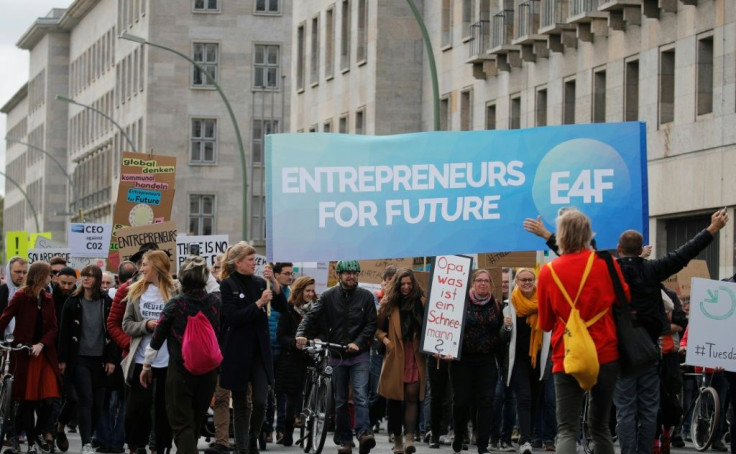Companies On 'Strike' For The Climate: Action Or Advertising?

"Strike for climate action" is the watchword coming not from the shop steward but the C-suite as many companies publicise their support for Friday's mobilisation, but positioning to capture consumers that isn't translated into action carries risks.
While the movement may not be massive, it is global: around the world companies have gone public and associated themselves with the global climate protests on September 20 and 27.
The American outdoor clothing company Patagonia, for example, has publicised widely its decision to close its 107 stores on both days to encourage its employees to participate in the events.
"We're on strike in Solidarity with the youth-led global climate strike for a better future and climate climate justice for everyone," says the website for SodaStream, the Israeli-based home soda system maker now owned by Pepsico.
"We'll be back on September 21st."
In Germany, 2,400 firms have joined under the banner of "Entrepreneurs for Future".
Employees of companies such as Zalando, Delivery Hero and Flixbus were marching in suit and tie to demonstrate the support of the business world.
The popular organic supermarkets Alnatura were operating with skeleton staffs.
Under pressure
Companies are coming under "pressure from both citizens, who have never been as concerned about environmental questions, as well as consumers who are demanding that firms assume their responsibilities in the larger ecosystem, said Guenaelle Gault, head of the Society and Consumption Observatory, a Paris-based research and consultancy firm.
Employees are also putting pressure on their employers: nearly 1,700 Amazon employees plan to join demonstrations on Friday.
"As employees at one of the largest and most powerful companies in the world, our role in facing the climate crisis is to ensure our company is leading on climate, not following," said their strike petition.
"We have to take responsibility for the impact that our business has on the planet and on people."
Jeff Bezos, the head of the online retail and technology behemoth, which was recently singled out by Greenpeace for its carbon emissions, pledged on Thursday to make its operations carbon neutral by 2040.
Meanwhile Google announced on Thursday a record-high boost to its green electricity purchases, after having become in 2017 the first firm of its size to offset its entire annual electricity consumption with renewable energy.
Can't settle for 'greenwashing'
If these companies "open the floodgates, they then have to take real engagements, for example cancelling exiting commercial contracts, which rapidly becomes very complicated," said Gault.
Heavily polluting companies in the energy and industrial sectors have been more discrete about the climate strikes, even if Swedish truck and bus manufacturer Scania has dedicated Friday to employee training on sustainability.
"There is a form of schizophrenia in jointing the march without supporting the movement" with action, something which could pose problems for companies "whose environmental footprint can't easily be shrunk," said public relations specialist Jean-Christophe Alquier.
Hover he sees a "formidable marketing platform" in the strikes for companies wanting to show they have taken on board the need to take action on the climate.
But "there is risk as the demand for change is very strong in a situation where there is lots of mistrust of these actors," said Gault.
"Companies can't settle for just 'greenwashing'".
The movement's organisers are on the lookout for companies just looking for marketing opportunities.
"To change everything, we need everyone," said Clemence Dubois of the activist group 350.
"So many big companies coming out in support of the strikes shows that it is now impossible to turn away from the climate crisis, but of course, actions prove louder than words," she said.
"The next step will be for major corporations to do so, by re-directing finance and changing their practices."
© Copyright AFP 2024. All rights reserved.





















